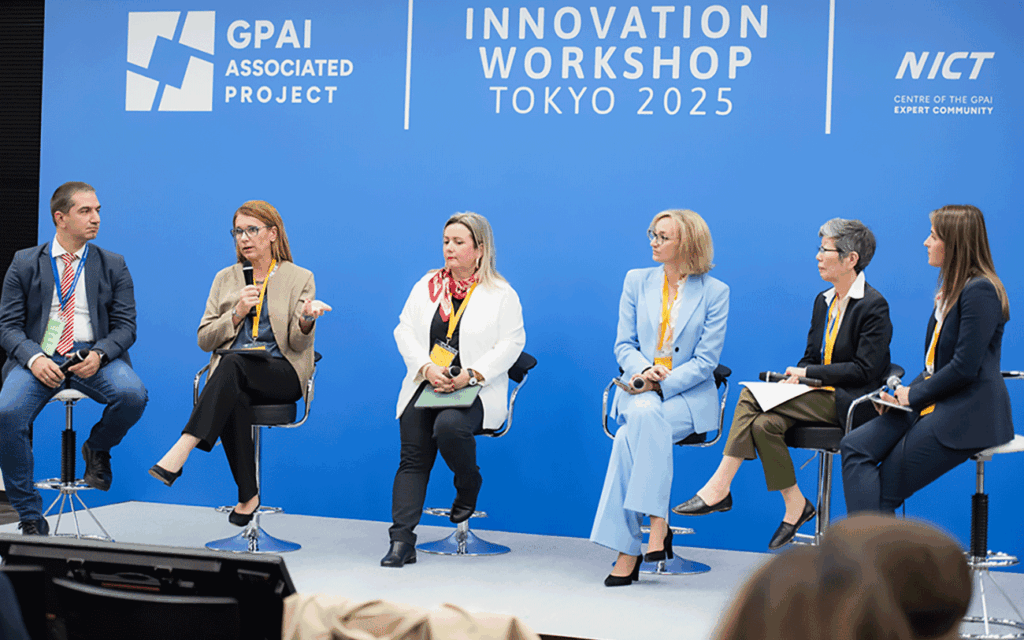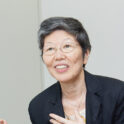Advancing human-centric AI: Highlights from the 2025 GPAI-Associated Innovation Workshop in Tokyo
Organised by the Tokyo Centre of the GPAI Expert Community

Fresh from the Global Partnership on AI (GPAI) Tokyo Innovation Workshop 2025, which took place on 28 and 29 May at NICT in Tokyo, Japan, the event brought together over 170 leading voices in AI policy, research, and innovation from all stakeholder groups of GPAI’s expert community. Overlooking the city’s dynamic tech environment, participants worked in breakout groups and plenary sessions that allowed for both deep dives and cross-cutting dialogue.
In July 2024, the previous GPAI initiative and the work of OECD member countries on AI joined forces under the GPAI brand to create an integrated partnership hosted at the OECD. GPAI’s renewed form is a big step forward—bringing together the policy strength of the OECD and the experimental, applied focus of GPAI, with all GPAI member countries participating on equal footing.
Before this, we were working separately—OECD since 2016 on global AI policy, and GPAI since 2019 on multi-stakeholder, project-based collaboration. We were aligned in purpose, but not yet integrated.
Now, under the GPAI Integrated Partnership, we’re working together. This means more than just formal coordination; it involves building bridges between policy and practice, as well as between governments and expert communities, frameworks and fieldwork.
It also unites all the expert groups—from OECD.AI and GPAI—and the Centres of the GPAI Expert Community in Tokyo, Montreal, and Paris. This broader community allows us to deepen our expertise and amplify our collective reach.
Organised by the GPAI-Associated Tokyo Centre, which is hosted by Japan’s National Institute of Information and Communications Technology, NICT, global experts came together to co-design solution-oriented projects to advance human-centric and responsible AI.
A collaborative innovation workshop
The Innovation Workshop was more than a meeting—it was a collaborative platform designed to explore select practical AI themes in AI policy and practice. Participants worked together in small groups on real-world challenges to develop project concepts that will help shape future projects associated with the Global Partnership on AI (GPAI) at the OECD.
A diverse group of participants from ASEAN countries and around the world
Participants included a diverse mix of stakeholders from around the world, including government officials from countries, including many ASEAN countries, academic researchers, industry leaders, technical experts, and representatives from civil society. This broad range of perspectives is one of GPAI’s greatest strengths, reflecting its multi-stakeholder model of global AI collaboration.
Some of the plenary speakers and moderators included Hiroaki Kitano (Sony Group Corporation), Jeff Ward (Animikii Indigenous Technology), Lee Tiedrich (Duke University), Amir Banifatemi (Cognizant) and Seydina Moussa (Cheikh Hamidou Kane Digital University).
The group discussions were guided by inclusive principles designed to create an open, respectful and generative environment. Four thematic groups focused on AI in the ‘Global South’, open-source AI, interoperability across AI governance frameworks and multilingual and multicultural AI.
AI in the ‘Global South’
One of the central themes of the workshop was how to empower emerging and developing economies to participate meaningfully in global AI innovation. The “Global South” working groups explored concrete ways to strengthen local AI ecosystems through capacity building, inclusive infrastructure, and regional cooperation.
Discussions emphasised the importance of ensuring that AI solutions are locally relevant, address development priorities, and reflect the diverse voices of communities. Participants stressed the need to strengthen the AI ecosystem, reduce its inequalities, and encourage community-led AI initiatives.
Open-source AI
With echoes from the Global South session, the open-source track focused on the transformative potential of open and collaborative AI development. Participants discussed the opportunities and challenges of making AI technologies more accessible, auditable, and reusable. There was a strong consensus that open-source AI can enhance transparency and innovation, and that it requires thoughtful governance to ensure it is safe, equitable, and sustainable. Ideas centred around shared repositories, responsible licensing models, and capacity building to enable broader participation from underrepresented communities within the open-source ecosystem.
Interoperability across AI governance frameworks
In a globalised AI landscape, interoperability between governance frameworks has become essential. This group took on the complex task of identifying practical ways to align national and international AI policy frameworks. Participants stressed the importance of promoting mutual understanding and compatibility across legal, ethical, and technical dimensions. Proposed solutions included comparative mapping of governance tools, cross-border regulatory sandboxes, and shared metrics to evaluate alignment. The aim is to build coherent governance ecosystems that respect national sovereignty while fostering global cooperation.
Multilingual and multicultural AI
To elevate and connect all societies, AI systems must reflect the full spectrum of human language and culture. This group focused on improving linguistic and cultural inclusion in AI design and deployment. Participants discussed gaps in training data, the risk of cultural bias, and the underrepresentation of non-dominant languages in major AI models. Solutions ranged from building open, representative multilingual datasets to developing tools that support equitable access to AI services across communities. The group emphasised that inclusive AI isn’t just a technical challenge—it’s a societal imperative.
What’s next?
Several ideas that arose during the workshop will be presented in upcoming GPAI and GPAI-associated initiatives. These include:
- Further work on the AI Policy Toolkit for Developing Countries
- Collaborative guidance on open-source AI governance
- Pilot projects focused on inclusive multilingual datasets
- Comparative frameworks for AI regulatory interoperability
The concepts discussed in Tokyo will also inform preparations for the upcoming GPAI Plenary and Expert Community meetings in Paris, where member countries will have an opportunity to discuss next steps and partnerships.
Reflections and appreciation
The workshop served as a “sandbox” space for experimentation, critical thinking, and co-creation.
Discussions could lay the groundwork for future projects. Some are already addressed in existing GPAI workstreams; others open new paths forward for GPAI and GPAI associated workstreams.
Why it matters
The Tokyo Innovation Workshop exemplifies the evolving role of GPAI and the OECD in shaping the future of AI. As AI technologies continue to advance at an unprecedented pace, global, inclusive, and informed collaboration is more vital than ever.
By bringing together technical and policy communities to test ideas and foster international partnerships, the workshop represents a new model of agile global governance—one that can adapt, scale, and respond to the pressing challenges of AI today and in the future.


































